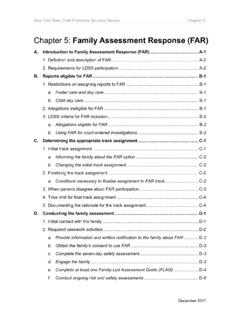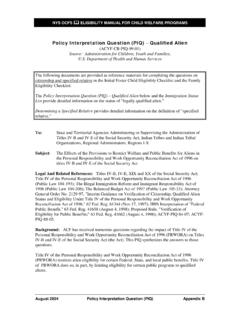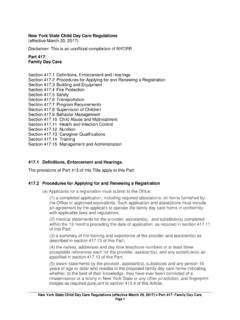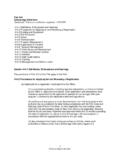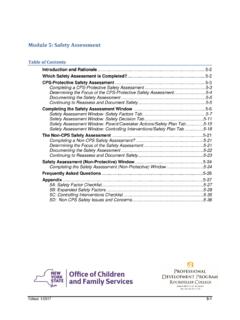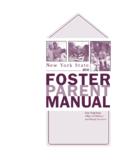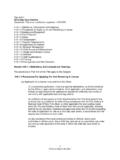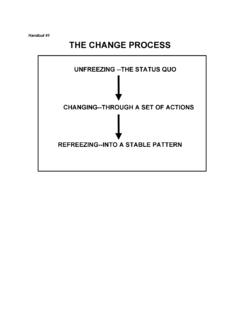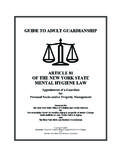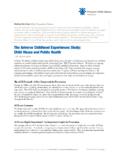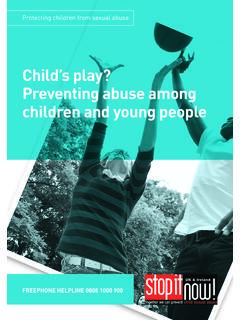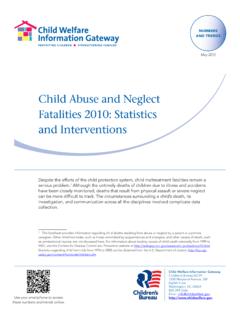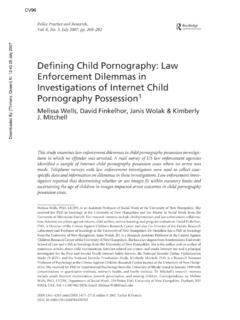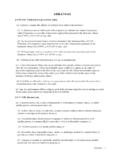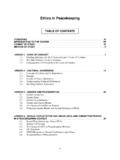Transcription of Summary Guide for Mandated Reporters
1 When Am I Mandated to Report? Mandated Reporters are required to report suspected child abuse or maltreatment when they are presented with a reasonable cause to suspect child abuse or maltreatment in a situation where a child , parent, or other person legally responsible for the child is before the Mandated reporter when the Mandated reporter is acting in his or her official or professional capacity. Other person legally responsible refers to a guardian, caretaker, or other person 18 years of age or older who is responsible for the care of the child . Mandated Reporters who are social services workers have expanded reporting requirements. Social services workers are required to report when, in their official or professional role, they are presented with a reasonable cause to suspect child abuse or maltreatment where any person is before the Mandated reporter and the Mandated reporter is acting in his or her official or professional capacity.
2 What is a Professional Role? For example, a doctor examining a child in her practice who has a reasonable suspicion of abuse must report her concern. In contrast, the doctor who witnesses child abuse when riding her bike while off-duty is not Mandated to report that abuse . The Mandated reporter s legal responsibility to report suspected child abuse or maltreatment ceases when the Mandated reporter stops practicing his/her profession. Of course, anyone may report any suspected abuse or maltreatment at any time and is encouraged to do so. Reasonable Cause to Suspect Reasonable cause to suspect child abuse or maltreatment means that, based on your rational observations, professional training and experience, you have a suspicion that the parent or other person legally responsible for a child is responsible for harming that child or placing that child in imminent danger of harm.
3 Your suspicion can be as simple as distrusting an explanation for an injury. Summary Guide for Mandated Reporters in New York State This material provides Mandated Reporters with an overview of their obligations and some basic information about the New York State child Protective Services (CPS) system. Who Are Mandated Reporters ? New York State recognizes that certain professionals are specially equipped to perform the important role of Mandated reporter of child abuse or maltreatment. Those professionals include: Physician Licensed creative arts therapist Social services worker Peace officer Registered physician's assistant Licensed marriage and family therapist Director of a - children's overnight camp.
4 - summer day camp or - traveling summer day camp Police officer Surgeon Licensed mental health counselor District attorney or assistant district attorney Medical examiner Licensed psychoanalyst Day care center worker Investigator employed in the office of the district attorney Coroner Licensed behavior analysts School age child care worker Dentist Certified behavior analyst assistants Provider of family or - group family day care Any other law enforcement official Dental hygienist Hospital personnel engaged in the admission, examination, care or treatment of persons Employee or volunteer in a residential care facility for children Osteopath Optometrist Christian science practitioner Chiropractor School official, including (but not limited to).
5 - teacher - guidance counselor - psychologist - social worker - nurse - administrator or other school personnel required to hold a teaching or administrative license or certificate Any other child care or foster care worker Podiatrist Resident Mental health professional Intern Substance abuse counselor Psychologist Alcoholism counselor Registered nurse All persons credentialed by the NYS Office of Alcoholism and Substance abuse Services Social worker Emergency medical technician The entire current list can be found in Article 6, Title 6, and Section 413 of the New York Social Services Law. The website can be accessed online through the New York State Legislature's Website ( ).
6 Click on Laws of New York to access Social Services Law. What Is abuse and Maltreatment? abuse abuse encompasses the most serious injuries and/or risk of serious injuries to children by their caregivers. An abused child is one whose parent or other person legally responsible for his or her care inflicts serious physical injury upon the child , creates a substantial risk of serious physical injury, or commits a sex offense against the child . abuse also includes situations where a parent or other person legally responsible knowingly allows someone else to inflict such harm on a child . Maltreatment (Includes Neglect) Maltreatment means that a child s physical, mental or emotional condition has been impaired, or placed in imminent danger of impairment, by the failure of the child 's parent or other person legally responsible to exercise a minimum degree of care by: failing to provide sufficient food, clothing, shelter, education; or failing to provide proper supervision, guardianship, or medical care (refers to all medical issues, including dental, optometric, or surgical care).
7 Or inflicting excessive corporal punishment, abandoning the child , or misusing alcohol or other drugs to the extent that the child was placed in imminent danger. Poverty or other financial inability to provide the above is not maltreatment. Note: The definitions of abuse and maltreatment are different for children in residential facilities operated or licensed by the state. How Do I Recognize child abuse and Maltreatment? The list that follows contains some common indicators of abuse or maltreatment. This list is not all-inclusive, and some abused or maltreated children may not show any of these symptoms. Indicators of Physical abuse Can Include: Injuries to the eyes or both sides of the head or body (accidental injuries typically only affect one side of the body); Frequent injuries of any kind (bruises, cuts, and/or burns), especially if the child is unable to provide an adequate explanation of the cause.
8 These may appear in distinctive patterns such as grab marks, human bite marks, cigarette burns, or impressions of other instruments; Destructive, aggressive, or disruptive behavior; Passive, withdrawn, or emotionless behavior; Fear of going home or fear of parent(s). Indicators of Sexual abuse Can Include: Symptoms of sexually transmitted diseases; Injury to genital area; Difficulty and/or pain when sitting or walking; Sexually suggestive, inappropriate, or promiscuous behavior or verbalization; Expressing age-inappropriate knowledge of sexual relations; Sexual victimization of other children. Indicators of Maltreatment Can Include: Obvious malnourishment, listlessness, or fatigue; Stealing or begging for food; Lack of personal care poor personal hygiene, torn and/or dirty clothes; Untreated need for glasses, dental care, or other medical attention; Frequent absence from or tardiness to school; child inappropriately left unattended or without supervision.
9 Summary Guide for Mandated Reporters in New York State Where Do I Call to Make a Report? As soon as you suspect abuse or maltreatment, you must report your concerns by telephone to the New York Statewide Central Register of child abuse and Maltreatment (SCR). The SCR is open 24 hours a day, seven days a week, to receive your call. The timeliness of your call is vital to the timeliness of intervention by the local department of social services child Protective Services (CPS) unit. You are not required to notify the parents or other persons legally responsible either before or after your call to the SCR. In fact, in some cases, alerting the parent may hinder the local CPS investigation and adversely affect its ability to assess the safety of the children.
10 The telephone numbers to report abuse or maltreatment by a parent, foster care or day care are: Mandated Reporter (800) 635-1522 Public Hotline (800) 342-3720 For abuse by Institutional Staff: 1-855-373-2122 One county runs its own child abuse hotline that may be used instead of the SCR: Onondaga County (315) 422-9701 Oral reports to the SCR from a Mandated reporter must be followed within 48 hours by a written report to the local department of social services CPS unit on form LDSS-2221A. A copy of this form and the local mailing address can be obtained by contacting your local department of social services, or by visiting the New York State Office of Children and Family Services (OCFS) website at Click on Forms , then click on Try a keyword , enter the form number in the box and click Find.
